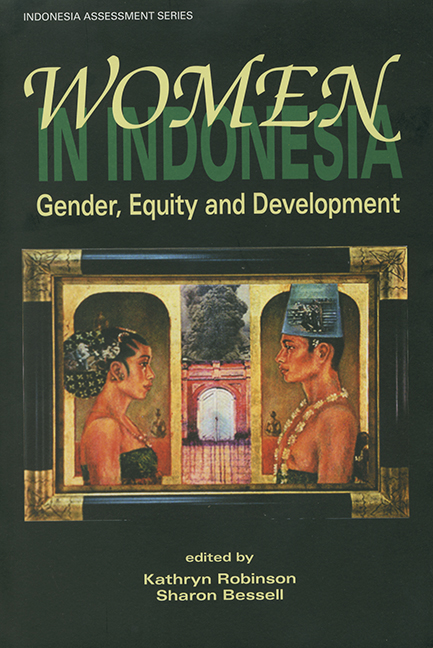Book contents
- Frontmatter
- Contents
- Tables
- Figures
- Contributors
- Acknowledgments
- Glossary
- Prologue
- 1 Introduction to the Issues
- 2 The Mega Factor in Indonesian Politics: A New President or a New Kind of Presidency?
- 3 The Downfall of President Abdurrahman Wahid: A Return to Authoritarianism?
- 4 The Year in Review: From Blind Man's Bluff to Mega Expectations
- 5 Further Comments on the Economy, with a Gender Perspective
- 6 Institution Building: An Effort to Improve Indonesian Women's Role and Status
- Commentary
- 7 Feminism in Indonesia in an International Context
- 8 Gay and Lesbi Subjectivities, National Belonging and the New Indonesia
- 9 And the Winner Is … Indonesian Women in Public Life
- 10 Indonesian Women Artists: Transcending Compliance
- 11 Literature, Mythology and Regime Change: Some Observations on Recent Indonesian Women's Writing
- 12 Women and the Labour Market during and after the Crisis
- 13 Women's International Labour Migration
- 14 Customary Institutions, Syariah Law and the Marginalisation of Indonesian Women
- 15 Women's Grassroots Movements in Indonesia: A Case Study of the PKK and Islamic Women's Organisations
- 16 Women's Activism against Violence in South Sulawesi
- 17 Gender Mainstreaming and Sex-disaggregated Data
- 18 The Changing Indonesian Household
- 19 Women, Family Planning and Decentralisation: New Variations on Old Themes
- 20 Men, Women and Community Development in East Nusa Tenggara
- References
- Index
- INDONESIA ASSESSMENT SERIES
4 - The Year in Review: From Blind Man's Bluff to Mega Expectations
Published online by Cambridge University Press: 21 October 2015
- Frontmatter
- Contents
- Tables
- Figures
- Contributors
- Acknowledgments
- Glossary
- Prologue
- 1 Introduction to the Issues
- 2 The Mega Factor in Indonesian Politics: A New President or a New Kind of Presidency?
- 3 The Downfall of President Abdurrahman Wahid: A Return to Authoritarianism?
- 4 The Year in Review: From Blind Man's Bluff to Mega Expectations
- 5 Further Comments on the Economy, with a Gender Perspective
- 6 Institution Building: An Effort to Improve Indonesian Women's Role and Status
- Commentary
- 7 Feminism in Indonesia in an International Context
- 8 Gay and Lesbi Subjectivities, National Belonging and the New Indonesia
- 9 And the Winner Is … Indonesian Women in Public Life
- 10 Indonesian Women Artists: Transcending Compliance
- 11 Literature, Mythology and Regime Change: Some Observations on Recent Indonesian Women's Writing
- 12 Women and the Labour Market during and after the Crisis
- 13 Women's International Labour Migration
- 14 Customary Institutions, Syariah Law and the Marginalisation of Indonesian Women
- 15 Women's Grassroots Movements in Indonesia: A Case Study of the PKK and Islamic Women's Organisations
- 16 Women's Activism against Violence in South Sulawesi
- 17 Gender Mainstreaming and Sex-disaggregated Data
- 18 The Changing Indonesian Household
- 19 Women, Family Planning and Decentralisation: New Variations on Old Themes
- 20 Men, Women and Community Development in East Nusa Tenggara
- References
- Index
- INDONESIA ASSESSMENT SERIES
Summary
The peaceful change in leadership from President Abdurrahman Wahid to President Megawati Sukarnoputri in early August 2001 has led to expectations of a rapid return of political stability and to a more positive mood in the country. The immediate rebound in confidence was clear, with the rupiah strengthening from Rp 11,000 to Rp 9,000 against the US dollar. Despite initial low expectations about the new president's leadership capability and intellectual capacity, she passed the first test by not compromising on professionalism and experience in forming her cabinet. The economic cabinet is made up of professionals or experienced bureaucrats known to be market-friendly and outward-looking. The cabinet certainly worked hard to clear the important hurdles that had eluded the Abdurrahman government since the end of 2000, namely rebuilding trust with the International Monetary Fund (IMF) and the international creditor community through successful approval of the IMF Letter of Intent, thus clearing the way for disbursement of the long-overdue US$400 million loan tranche, phase two of Paris Club II negotiations and preparations for the next Consultative Group on Indonesia (CGI) meeting. President Megawati has also sent out clear messages on eliminating corruption, openness of the economy and reforms. One could say that she has initially surpassed ‘Mega expectations’.
Unfortunately the events following the September 11 terrorist attacks on New York will have a wider and longer impact than earlier thought. The slowdown of the US and world economy has become a certainty, with projections for recovery now being longer than previously anticipated. Business and consumer confidence has been affected, while protests and increased anti-West sentiment have once more affected confidence and perceptions of law and order and security. The rupiah weakened to Rp 11,000/US$ and has stubbornly remained at around the Rp 10,500/US$ level.
This chapter reviews economic developments since the last update in October 2000 (Bird 2001) and attempts to make some short-term predictions for the coming year. It is important to bear in mind that even the best of governments would have an uphill task to achieve significant results given the changed context of policy-making in Indonesia's new-found democracy and the weakness and lack of capacity of the country's institutions. Nevertheless, there is scope for progress to be made on reform and institutional change over the coming year if the leadership and government are committed to act, and deliver, in a number of priority areas.
- Type
- Chapter
- Information
- Women in IndonesiaGender, Equity and Development, pp. 41 - 60Publisher: ISEAS–Yusof Ishak InstitutePrint publication year: 2002

